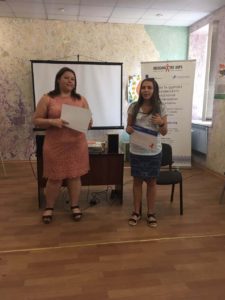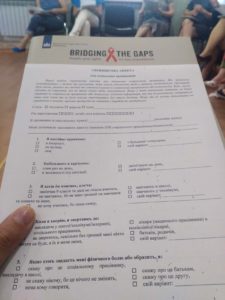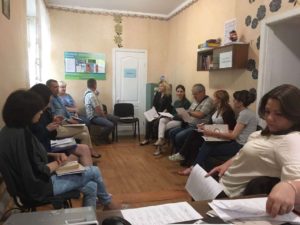 Traditionally, there is an understanding that human right defenders organize actions, protest by the parliament, or we think of them as of those having legal education and regularly going to courts. However, every person can be a human right defender. Each specialist who provides services to vulnerable groups is, in fact, a human rights defender.
Traditionally, there is an understanding that human right defenders organize actions, protest by the parliament, or we think of them as of those having legal education and regularly going to courts. However, every person can be a human right defender. Each specialist who provides services to vulnerable groups is, in fact, a human rights defender.
Reasons for implementing the monitoring tool
Within the last years, Ukraine has achieved great successes in fighting HIV epidemics. However, there are still many gaps that require immediate attention. First of all, there is a gap in providing prevention and treatment services for most at risk adolescents and youth, especially those who used drugs.
Starting from 2012, International Charitable Foundation “AIDS Foundation East-West” (AFEW–Ukraine) has been supporting the establishment of the system of services for adolescents using drugs. This work is conducted within the framework of the Bridging the Gaps project. Social bureaus, rehabilitation center and daycare centers in four cities were opened and are functioning successfully. Only in 2017, these centers and bureaus provided 21,290 services to 1,215 adolescents.
Project experience demonstrates that the rights of underage drug users are often violated, and this fact remains unknown to anyone from their close environment. Lack of response leads to repeated cases of violations, thus creating barriers in getting timely assistance, and, as a result, increases the possibility of negative consequences of drug use and unsafe behaviours. Therefore, violation of rights of underage drug users, that remains unnoticed is among the factors that contribute to increased risks of HIV infection.
Despite frequent cases of violations reported by service providers, these cases are not officially registered and publicly unknown.
That is why in 2016 AFEW-Ukraine and its partners started developing a tool for monitoring human rights violations of adolescents using drugs. The tool can be also applied to any other category of MARA, and it can be used by any specialist who works with MARA and has basic knowledge about human rights.
 The overall objective of its implementation was to collect the data about cases of violations so that services providers and stakeholders could understand the scope of the problem and, based on that, improve and adjust advocacy actions on the national and local levels. Besides, use of the tool could help to provide timely response to the violations of rights of each client, offering an algorithm of actions that can facilitate it. This instrument can be used by a wide range of organizations and specialists that work with vulnerable children, adolescents and youth.
The overall objective of its implementation was to collect the data about cases of violations so that services providers and stakeholders could understand the scope of the problem and, based on that, improve and adjust advocacy actions on the national and local levels. Besides, use of the tool could help to provide timely response to the violations of rights of each client, offering an algorithm of actions that can facilitate it. This instrument can be used by a wide range of organizations and specialists that work with vulnerable children, adolescents and youth.
“Our task was to demonstrate that a social worker or any other professional working with key populations can stand for the rights of their clients. That it, in fact, does not require special legal education nor being a part of job description. However, specialists often do not understand that the problems faced by their clients are in fact cases of human rights violations that need special attention,” comments Anastasiya Shebardina, senior project manager from AFEW-Ukraine.
Piloting the monitoring tool
The tool for monitoring the violations of human rights of MARA consists of the directions on the use of the tool, screening questionnaire for service providers to identify the cases of violation, a template for the legal claim and online form for registering the cases of human rights violations that are filled by social workers or other specialists. The forms are filled online on the website of AFEW-Ukraine.
In each project city, AFEW-Ukraine organized introductory trainings for over 100 specialists from partner NGOs and service providers from referral network. Also, an educational webinar was organized for a wider range of participants who wished to learn more about the monitoring tool. In the nearest future, a free online course on human rights monitoring for most-at-risk youth will be developed.
 Results of monitoring tool piloting
Results of monitoring tool piloting
In 2017, 792 interviews with adolescents and youth were conducted with the use of screening questionnaire in 4 pilot cities. Among them, 430 adolescents were 14-18 years old. A number of cases of human rights violations, registered in an online form was 92 (12%) of all surveyed.
The results of piloting the tool demonstrate that the format for monitoring and documenting cases of human rights violations helps service providers to better recognize them and provide timely response to violations. The analysis of the documented cases allows to identify typical situations for each separate region or city and make advocacy actions more effective.
Documentation and analysis of cases with the use of monitoring tool will be continued and be used for further advocacy.



